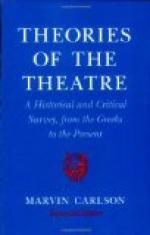IV
A comparison of an Elizabethan audience with a theatre-full of people at the present day is, in many ways, disadvantageous to the latter. With our forefathers, theatre-going was an exercise in the lovely art of “making-believe.” They were told that it was night and they forgot the sunlight; their imaginations swept around England to the trampling of armored kings, or were whisked away at a word to that Bohemia which is a desert country by the sea; and while they looked upon a platform of bare boards, they breathed the sweet air of the Forest of Arden. They needed no scenery by Alma-Tadema to make them think themselves in Rome. “What country, friends, is this?”, asked Viola. “This is Illyria, lady.” And the boys in the pit scented the keen, salt air and heard the surges crashing on the rocky shore.
Nowadays elaborateness of stage illusion has made spoiled children of us all. We must have a doll with real hair, or else we cannot play at being mothers. We have been pampered with mechanical toys until we have lost the art of playing without them. Where have our imaginations gone, that we must have real rain upon the stage? Shall we clamor for real snow before long, that must be kept in cold storage against the spring season? A longing for concreteness has befogged our fantasy. Even so excellent an actor as Mr. Forbes-Robertson cannot read the great speech beginning, “Look here, upon this picture and on this,” in which Hamlet obviously refers to two imaginary portraits in his mind’s eye, without pointing successively to two absurd caricatures that are daubed upon the scenery.
The theatre has grown older since the days when Burbage recited that same speech upon a bare platform; but I am not entirely sure that it has grown wiser. We theatre-goers have come to manhood and have put away childish things; but there was a sweetness about the naivete of childhood that we can never quite regain. No longer do we dream ourselves in a garden of springtide blossoms; we can only look upon canvas trees and paper flowers. No longer are we charmed away to that imagined spot where journeys end in lovers’ meeting; we can only look upon love in a parlor and notice that the furniture is natural. No longer do we harken to the rich resonance of the Drama of Rhetoric; no longer do our minds kindle with the brilliant epigrams of the Drama of Conversation. Good reading is disappearing from the stage; and in its place we are left the devices of the stage-carpenter.
It would be absurd to deny that modern stagecraft has made possible in the theatre many excellent effects that were not dreamt of in the philosophy of Shakespeare. Sir Arthur Pinero’s plays are better made than those of the Elizabethans, and in a narrow sense hold the mirror up to nature more successfully than theirs. But our latter-day fondness for natural representment has afflicted us with one tendency that the Elizabethans




